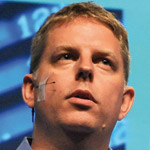 Jason Zander
Jason Zander
Microsoft’s TechEd and Partner Summit conferences this year were all about Microsoft’s new focus – consumers
Microsoft held its annual TechEd and Partner Summit events in Durban recently, combining the events, for once, into a solid four days of tech and talks, with a party or two thrown in for good measure.
The keynote address set the tone for the TechEd portion of the conference. Jason Zander, corporate VP of the Visual Studio Team in the Developer Division at Microsoft, talked attendees through a lot of code, which baffled the business folk, but apparently excited a lot of the geeks.
Microsoft also took the opportunity on the opening day to announce the imminent arrival in South Africa of Azure, its cloud platform, and Office365, its cloud Office offering.
According to Zander, Azure is planned for release between March and May 2012. Office 365, which aims to bring cloud productivity to businesses of all sizes, will be commercially available in the first half of 2012, with trial availability towards the end of this year.
“Office 365 is the best of everything we know about productivity, all in a single cloud service,” comments Zander. “The power of cloud solutions allows companies to rent computing power, rather than acquire it outright. Microsoft Office 365 is software-as-a-service, a form of cloud computing where business services are presented to the end user in a subscription model.”
Microsoft’s James Avenant says the new offering brings together Microsoft Office, SharePoint Online, Exchange Online and Lync Online in an always-up-to-date cloud service, at a predictable monthly subscription.
Microsoft SA MD Nteto Nyati outlined the conference’s broader themes in his keynote: “You’re going to see a whole bunch of devices of different shapes, sizes, form factors, speeds, usage types. We need a world of devices, and they need to be smart. They need to create data, they need to connect to the cloud.”
He even welcomed the “iThings” that were visible in many delegates’ hands and bags, saying the company likes competition, and welcomes it.
Microsoft’s shift in focus to its consumer offerings was obvious, with Windows Phone getting a great deal of airtime, and the company’s enterprise offering receiving far less headline attention than delegates had come to expect at such events.
Nyati said the theme of the event was “creating the future together”, focusing on three things – cloud, productivity and devices.
Holistic view
According to Nyati, the company realised six months ago that it had a lot of assets related to consumers - XBox, Windows PCs, Office, MSN, Bing, etc – but that none of them were being taken to consumers in a co-ordinated way, nor did they talk to each other.“Plus, we saw the trend to the consumerisation of IT. If the company is not relevant to consumers in the long run, it will not be relevant to the enterprise,” he adds.
The consumerisation of IT trend is well-established, and has been causing consternation amongst vendors and corporate IT departments for at least the past three years. It’s gaining momentum, helped rapidly along by the iPad, which dragged tablets into the mainstream when it launched.
Nyati says the company has put a new strategy together around the refocus, and made structural changes – like forming a Consumer Channel Group in every geography, which will, in future, work with companies that touch customers – telcos, banks, financial services organisations – “to make products more sticky”.
“It’s important that we have devices and products that talk to each other,” he says. “Users will see this new strategy in Windows Phone Mango – you can play Xbox from the phone, Zune is there, there’s integrated search – all the assets are switched on via the phone. This will happen with all products in future. So, for example, Windows Phone 8 could interact with the desktop via voice, gestures, and so on. “
Microsoft is also working on a tablet, he says. “We believe there is space in the market. Current tablets are great for consuming content, but if you look at information workers its not just about consuming its about creating content too.”
Nyati says a tablet should be able to do the same things a laptop can. “You shouldn’t need to carry two devices,” he notes.
The company is heralding its refocus in the local market with a substantial above the line advertising campaign in the run up to the festive season. “We’ll be advertising on TV, and so on. South Africa is one of 30 top markets (identified as growth markets by Microsoft) that we need to go into very strongly.”
|
Post a comment
|
Login.
All rights reserved © Copyright by ITWeb, 2011


